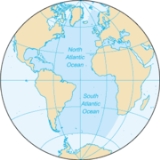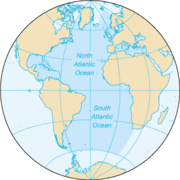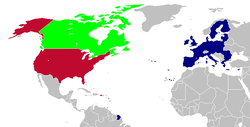
Transatlantic relations
Encyclopedia

International relations
International relations is the study of relationships between countries, including the roles of states, inter-governmental organizations , international nongovernmental organizations , non-governmental organizations and multinational corporations...
between countries on both side of the Atlantic Ocean
Atlantic Ocean
The Atlantic Ocean is the second-largest of the world's oceanic divisions. With a total area of about , it covers approximately 20% of the Earth's surface and about 26% of its water surface area...
. Sometimes specifically those between the United States
United States
The United States of America is a federal constitutional republic comprising fifty states and a federal district...
, Canada
Canada
Canada is a North American country consisting of ten provinces and three territories. Located in the northern part of the continent, it extends from the Atlantic Ocean in the east to the Pacific Ocean in the west, and northward into the Arctic Ocean...
and the countries in Europe
Europe
Europe is, by convention, one of the world's seven continents. Comprising the westernmost peninsula of Eurasia, Europe is generally 'divided' from Asia to its east by the watershed divides of the Ural and Caucasus Mountains, the Ural River, the Caspian and Black Seas, and the waterways connecting...
, although other meanings are possible.
There are a number of issues over which the United States and Europe generally disagree. Some of these are cultural, such as the U.S. use of the death penalty, some are international issues such as the Middle East
Middle East
The Middle East is a region that encompasses Western Asia and Northern Africa. It is often used as a synonym for Near East, in opposition to Far East...
peace process
Peace process
Peace process may refer to:* in general:** Peacebuilding** Conflict resolution* specifically:** Northern Ireland peace process, efforts from c.1993 to end "the Troubles"...
where the United States is often seen as pro-Israel and where Europe is often seen as pro-Arab, and many others are trade related. The current U.S. policies are often described as being unilateral in nature, whereas the European Union
European Union
The European Union is an economic and political union of 27 independent member states which are located primarily in Europe. The EU traces its origins from the European Coal and Steel Community and the European Economic Community , formed by six countries in 1958...
and Canada are often said to take a more multilateral approach, relying more on the United Nations
United Nations
The United Nations is an international organization whose stated aims are facilitating cooperation in international law, international security, economic development, social progress, human rights, and achievement of world peace...
and other international institutions to help solve issues. Of course, there are many other issues upon which they do agree.
Definition

For example:
Within a group:
- Intra-NATO relations
- e.g. Canada and NATOCanada and NATOCanada has been a member of the North Atlantic Treaty Organization since its inception in 1949. Canada was not only a member but one of the principal initiators of the alliance. This was a marked break with Canada's pre-war isolationism, and was the first peacetime alliance Canada had ever...
Between groups:
- EU - North American Free Trade AgreementNorth American Free Trade AgreementThe North American Free Trade Agreement or NAFTA is an agreement signed by the governments of Canada, Mexico, and the United States, creating a trilateral trade bloc in North America. The agreement came into force on January 1, 1994. It superseded the Canada – United States Free Trade Agreement...
(NAFTA) relations - European Free Trade AreaEuropean Free Trade AreaAt present, there are three multi-lateral free trade areas in Europe, plus the European Union which has a single market, and one former-FTA in recent history...
(EFTA) - NAFTA relations - Transatlantic Free Trade AreaTransatlantic Free Trade AreaThe Transatlantic Free Trade Area is a proposed free trade area between the United States and the European Union in reaction to the growing economic power of the People's Republic of China. It was considered in the 1990s and again in 2007 but no firm plan has been made...
(theoretical) - CARIFORUM - European CommissionACP countriesThe African, Caribbean and Pacific Group of States is a group of countries , created by the Georgetown Agreement in 1975. The group's main objectives are sustainable development and poverty reduction within its member states, as well as their greater integration into the world's economy...
(Economic Partnership AgreementsEconomic Partnership AgreementsEconomic Partnership Agreements are a scheme to create a free trade area between the European Union and the African, Caribbean and Pacific Group of States . They are a response to continuing criticism that the non-reciprocal and discriminating preferential trade agreements offered by the EU are...
)
Between a group and a state:
- Canada – European Union relations
- European Union – United States relations
- Canada - EFTA Free Trade Agreement
Between states:
- Germany – United States relations
- Canada-France relations, etc.
By language and culture
- Commonwealth of NationsCommonwealth of NationsThe Commonwealth of Nations, normally referred to as the Commonwealth and formerly known as the British Commonwealth, is an intergovernmental organisation of fifty-four independent member states...
- Community of Portuguese Language Countries
- Dutch UnionDutch Language UnionThe Dutch Language Union is an international institution for discussing issues regarding the Dutch language. It was founded on 9 September 1980 by the Netherlands and Belgium...
- La FrancophonieLa FrancophonieFrancophonie is an international organization of politics and governments with French as the mother or customary language, where a significant proportion of people are francophones , or where there is a notable affiliation with the French language or culture.Formally known as the Organisation...
- Latin UnionLatin UnionThe Latin Union is an international organization of nations that use Romance languages, with the aim of protecting, projecting, and promoting the common cultural heritage and unifying identities of the Latin, and Latin-influenced, world. It was created in 1954 in Madrid, Spain, and has existed as a...
The boundaries of which states are part of Transatlantic relations depends on the context. The term may be used as a euphemism to a specific bilateral relationship, for example, Anglo-American relations
Anglo-American relations
British–American relations encompass many complex relations over the span of four centuries, beginning in 1607 with England's first permanent colony in North America called Jamestown, to the present day, between the United Kingdom of Great Britain and Northern Ireland and the United States of...
. The boundary could be drawn so as only to refer member states of the EU plus the US, when discussing Euro-American relations
Euro-American relations
Relations between the European Union and the United States are the bilateral relations between the European Union and the United States of America . Due to the EU not having a fully integrated foreign policy, relations can be more complicated where the EU does not have a common agreed position e.g...
. In other circumstances it may include Canada, or non-EU countries in Europe. The term may also be used in the context of the wider Atlantic world including Africa and Latin America.
History
The early relationship between Europe and America was based on colonialismColonialism
Colonialism is the establishment, maintenance, acquisition and expansion of colonies in one territory by people from another territory. It is a process whereby the metropole claims sovereignty over the colony and the social structure, government, and economics of the colony are changed by...
and merchantilism. All modern states in the Americas can be traced back to colonial states that were founded by European nations, states that were very different from the pre-Columbian
Pre-Columbian
The pre-Columbian era incorporates all period subdivisions in the history and prehistory of the Americas before the appearance of significant European influences on the American continents, spanning the time of the original settlement in the Upper Paleolithic period to European colonization during...
civilizations and cultures that had existed before.
Even after the United States (and later Canada) became independent, the main relationship between the two continents was one-way migration.
Politically the United States tried to keep a distance from European affairs, and Canada was subordinate to British foreign policy.
During the First World War however both North American states found themselves fighting in Europe and engrossed in European politics. President Woodrow Wilson
Woodrow Wilson
Thomas Woodrow Wilson was the 28th President of the United States, from 1913 to 1921. A leader of the Progressive Movement, he served as President of Princeton University from 1902 to 1910, and then as the Governor of New Jersey from 1911 to 1913...
's Fourteen Points
Fourteen Points
The Fourteen Points was a speech given by United States President Woodrow Wilson to a joint session of Congress on January 8, 1918. The address was intended to assure the country that the Great War was being fought for a moral cause and for postwar peace in Europe...
helped to redraw the map of Europe.
Although the Roosevelt administration wanted to enter the war against Germany, the vast majority of Americans were too isolationist and disillusioned at their experience in World War I
World War I
World War I , which was predominantly called the World War or the Great War from its occurrence until 1939, and the First World War or World War I thereafter, was a major war centred in Europe that began on 28 July 1914 and lasted until 11 November 1918...
to seek involvement in the World War II
World War II
World War II, or the Second World War , was a global conflict lasting from 1939 to 1945, involving most of the world's nations—including all of the great powers—eventually forming two opposing military alliances: the Allies and the Axis...
, at least until the U.S. was attacked by Japan at Pearl Harbor on December 7, 1941, and Adolf Hitler declared war on the United States on December 11, 1941. Once involved, the US became pivotal to the war effort and therefore European politics.
After the second war the United States and Canada both desired a permanent role in the defence of Europe, and European states wanted protection from the Soviet Union
Soviet Union
The Soviet Union , officially the Union of Soviet Socialist Republics , was a constitutionally socialist state that existed in Eurasia between 1922 and 1991....
. The result was the North Atlantic Treaty Organization, which became the lynchpin of Transatlantic relations during the Cold War
Cold War
The Cold War was the continuing state from roughly 1946 to 1991 of political conflict, military tension, proxy wars, and economic competition between the Communist World—primarily the Soviet Union and its satellite states and allies—and the powers of the Western world, primarily the United States...
.
See also
- Atlantic CommunityAtlantic CommunityThe Atlantic Community is a German-American project to apply Web 2.0 ideas to transatlantic foreign policy strategy. Launched in April 2007 as an undertaking of the Atlantic Initiative, the Atlantic Community aims at facilitating discussion between young thinkers and established members of the...
think tank - Center for Transatlantic Relations http://transatlantic.sais-jhu.edu
- European Union – United States relations
- Atlantic Council of the United States
- German Marshall FundGerman Marshall FundThe German Marshall Fund of the United States is a nonpartisan American public policy and grantmaking institution dedicated to promoting greater cooperation and understanding between North America and Europe....
- South Atlantic Peace and Cooperation ZoneSouth Atlantic Peace and Cooperation ZoneThe South Atlantic Peace and Cooperation Zone was created in 1986 through a UN resolution on Brazil's initiative, with the aim of promoting regional cooperation and the maintenance of peace and security in the region...
- Transatlantic Economic CouncilTransatlantic Economic CouncilThe Transatlantic Economic Council, or commonly called TEC, is a body set up between the United States and European Union to direct economic co-operation between the two economies.-Establishment and chairmanship:...
- Transatlantic Free Trade AreaTransatlantic Free Trade AreaThe Transatlantic Free Trade Area is a proposed free trade area between the United States and the European Union in reaction to the growing economic power of the People's Republic of China. It was considered in the 1990s and again in 2007 but no firm plan has been made...
(TAFTA) - Canada – European Union relations
- Canada and NATOCanada and NATOCanada has been a member of the North Atlantic Treaty Organization since its inception in 1949. Canada was not only a member but one of the principal initiators of the alliance. This was a marked break with Canada's pre-war isolationism, and was the first peacetime alliance Canada had ever...
External links
- A stronger EU-US Partnership and a more open market for the 21st century
- European Union Institute for Security Studies: The Obama Moment - European and American Perspectives
- Atlantic Council of the U.S.: Transatlantic Cooperation Against Terrorism
- Atlantic Council publications on transatlantic economics, security, and politics
- R. Nicholas Burns, Under Secretary of State for Political Affairs, called on the U.S. and Europe to embrace common purpose around an ambitious global agenda that would redefine its mission for the 21st Century.

